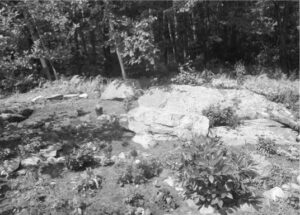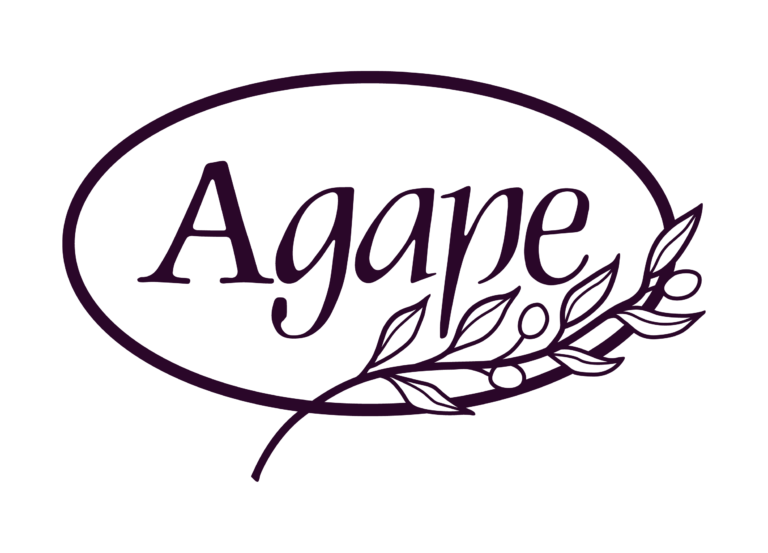by Suzanne Belote Shanley
As I walk to St. Francis House, I turn to the garden, just as the sun rises above the lush rows of broccoli, kale, lettuce, and all things green. The sun sheds her shining golden light over the sleeping clusters of green, stretching in anticipation of the day.
 The dense grape vines beside me need a careful eye to discern clusters of light green baby grapes, nudging their tiny, nearly invisible heads from behind the leaves where they nuzzle. Preoccupied with my next task, in a constant state of distraction, I suppress the urge to hold the grapes in my hands and kiss them. Interiorly I tell myself: “Go ahead Suzanne. Just kiss the grapes. Just kiss them.”
The dense grape vines beside me need a careful eye to discern clusters of light green baby grapes, nudging their tiny, nearly invisible heads from behind the leaves where they nuzzle. Preoccupied with my next task, in a constant state of distraction, I suppress the urge to hold the grapes in my hands and kiss them. Interiorly I tell myself: “Go ahead Suzanne. Just kiss the grapes. Just kiss them.”
All this beauty, right at my doorstep and yet, I detect in me hesitancy to let such beauty own me. I live in the glorious woods of the Quabbin Reservoir watershed, and yet I haven’t prayed over or touched the vibrant life in the soil in a visceral and reverential way since Beatrice Menase Kwe Jackson, arrived to teach us Native American prayer in preparation for the visit of Chief Arvol Looking Horse of Standing Rock. It’s easy to miss “the splendor in the grass, the glory in the flower” (Wordsworth), if I don’t stop as Beatrice did each morning, to touch the ground, whisper greetings to the insects and scurrying creatures, hallow the water set before us in copper urns, calling by name, the animals in the forest.
Beauty as Sanctuary
Earlier, I sat with my coffee at the Brigid House kitchen window, staring at the rock garden forming an intersecting circle around myriad delicate perennials with cone and other patterned shapes. I admire the small boulders etched in gray and white forming a ring around and seeming to protect the vulnerable, delicate blossoms. In Mary Oliver fashion, I say to myself: “Thank you rocks,”. Again, what I really want to do is to touch, even hug them. Instead, I stay indoors. Beatrice would have blessed them, called on Creator Spirit who placed them there, maybe even offer tobacco or smudge them.
From an inaccessible room within my soul, my inner voice calls to me: “You are lost. Covid and Trump are disorienting you. Get a grip. Put your life in perspective.” This idea of perspective had recently caught my attention as I read the lines from a John O ‘Donoghue poem, “Equilibrium”: “May our sense of irony bring perspective.” Irony. I have always loved the richness of this word, suggesting a reversal of the normal, the expected. In literature and in life, a little irony can bring perspective.
Searching for Irony
I want to regain balance by living my covid life ironically, while catastrophe besets the planet and all living beings. But, how to do this? How do I access irony and perspective amid chasms which have opened in my life, in our collective life as a species? The cultural malignancies suffocating us, are shattering, debilitating: Endless zoom meetings, masking as a way of life, reading analysis of the precipice, staying on top of Trump’s latest racist lies, yield disequilibrium, and more—despair.
But then the discordant, the reversal appears, strikes a chord: My downcast sense of gloom at our worsening human condition, switches suddenly and a burst of goodness wells up inside of me. I am overwhelmed with love of grapes and stones, of flowers and trees, a sustaining song of goodness. I imagine the rock garden boulders as Protectors of the Perennials. I feel unprotected. Protect me God. Protect us God. Be my boulder, Jesus. Yellow and orange wildflowers, intoxicating dawn freshness, urge me into wistfulness, maybe even equilibrium, certainly gratitude.
At 7:30 am, I enter the chapel for Morning Prayer, sensing the perfection of just sitting. The kaleidoscopic colors, earthy blues, greens and browns of the stained-glass windows say to me: “Color.” “See us. See our color.”The chapel silence before the first lifting of our collective community voices in chant, is familiar and reassuring. Brayton softly strikes the Buddha bowl eliciting an eternal chime, and I begin: “O God, open my lips and my mouth shall declare your praise.” I open my lips to pray and dark thoughts enter: Praise? During a pandemic, of such interminable suffering? Police brutality, right wing racist groups, violence in Portland. Praise?
I rarely lift my voice in prayer for Donald Trump, the mad potentate. Members of my extended family have died from the corona virus, and the daily death toll for people of color rises. How to pray? God, please give us courage to resist this satanic force field. Resistance during pandemic…distanced resistance…irony, reversal, response.
Jeremiah: The Weeping Prophet
Over these past months, given these realities, I whip myself up into a fever pitch politically while reading the prophetic words of Hosea, Micah and Amos. Jeremiah is particularly relevant to our times: His prophetic vision signals “the coming of terrors and horrors beyond imagining. When vision became reality, he witnessed those terrors and horrors.” (“From Creation to the Cross”).
Known as the “weeping prophet” Jeremiah’s Lamentations awaken in me the pain of our present reality. For Jeremiah, courage and hope arise in the midst of death and destruction. Yahweh reassures Jeremiah: “For I know the plans I have for you, plans to prosper you and not to harm you, plans to give you hope and a future.” (Jeremiah 29:11) Jeremiah responds with resistance to the oppressor and persistence in the face of extremity, jail, persecution.
Tension is a way of life for the biblical prophets, who receive from God warnings of outrages, catastrophes, polarizations. As I move through our own prophetic times, distracted and angry, I receive a consolation, the comforting rhythm of a new day. I encounter the red radiance of the day’s harvest of tomatoes in a woven basket, the cacophony of bird song, the heart-thrilling, deep call of the full-throated bull frogs. So much goodness is revealed in “not harming,” in ahimsa, endurance in the face of colossal evil and God’s promise of release, “hope for the future.”
Jeremiah’s journey appeals to me as he insists on God’s intervention. The sentiment of demanding, shouting in anger, lies on my own heart: stop this madness, this death-dealing, this power-hungry dictator. Yet, unlike Jeremiah, to whom God spoke, I know God as The Ineffable One, The Unreachable, Total Silence. During the universal distancing, you too, Oh God, feel remote, detached. Where are You? Will you intervene? Will you save us?
We are clamoring to be saved from Corona, a soothing word, soft o’s form in the throat and onto the lips. A “corona” is “a gaseous envelope of the sun and other stars.” In addition, “the sun’s corona is normally visible only during a total solar eclipse when it is seen as an irregularly shaped pearly glow surrounding the darkened disk of the moon.”
Certainly, given our present pandemic, there is symbolic resonance here. A taste of this celestial language, far beyond our present deadly concerns illustrates our need to name things to fit a transcendent mode, even a killer virus. Coronas are “white or colored” circles sometimes from “blue inside to red outside. …caused by thin clouds, mist or dust.” I am a reminded of the reds and blues in the perennial rock garden, cosmic connections, dust, ashes, death, corona.
I think of my sister-in-law, Tricia, dying of lung cancer during “the corona” as our granddaughter, Olivia refers to the plague. I wonder how Tricia experienced her last moments. How will I experience mine? Will there be a streaming of Divine Energy, indiscriminate, spectacular, inaccessible to us living on a material plane?
I long to remain in a consciousness of love for my home, this planet, the bitter travesty of its possible demise. Oh earth, how small and fragile you are. Who will protect you?
Jeremiah, called for Divine Retribution and judgment on those responsible for killing and death. Are we too being punished by a virus with a conspicuously cosmological name, for our neglect, our blindness? Do we reap what we sow? God speaks through the sun, the moon and stars, through the celestial as well as the death-dealing corona. A Voice shatters time and space with a reprimand: “Now look at what you have done!”
What is Required of Us?
Something is required beyond the daily fits and starts of my linear thinking. Mesmerized by the dance of death, I missed the appearance of the Comet Neowise in our night sky weeks ago, which will not occur again for 7,000 years. I wonder if I am too rooted in the planet’s technological cloud and less in the “Cloud of Unknowing,” as I struggle with the twin realities of needing to function and trying to come to grips with the violence that suffocates the planet.
At Agape, we ironically find comfort in the ordinary, such as our harvesting with two newly arrived interns who minister to us, healers with halos, Ohioans with a mission. Chloe and Ellen come as messengers, lending balance, insight, as they move through the quotidian at Agape with tender concern.
Yet, there are days when I feel like Dorothy Day as she records in her diary, The Duty of Delight, that I too am suffering form “nerves and fatigue” moving from task to community task, like “an empty cistern.” Reversal, upheaval creep in once again. I am reminded of the corona in my life, the crown of light hovering above everyone and everything here. The whiteness of cauliflower, the garlic cloves, basil, this sacred Nipmuc land.
During the pandemic, we learned of the cancer death of David Tall Pine White, the keeper of the Nipmuc language, with whom we dedicated a Weeping Blue Atlas Cedar tree, (cedar considered sacred by Indigenous people) at Agape four years ago, to honor the Nipmuc tribe, indigenous to this region. I gather in tree energy, a steadiness that encompasses poetry, cosmic blessings, Tall Pine’s gesture of love and healing.
Ilia Delio, the eco-feminist Franciscan sister and theologian recently suffered a concussion during these corona days. In the concussion’s aftermath, she drew a correlation between her crown of pain and the cosmos: “And the Cosmic Christ is the Christ of the corona, the cosmic crown of thorns, the perspective of the sublime.” This “concussion consciousness” as Delio defines it, means learning new ways of “minding the mind” as the Buddha realized. I am daily made aware of the work of healing, acquiring “cosmic consciousness” or, in Delio’s words, “healing the traumatized corona.”
